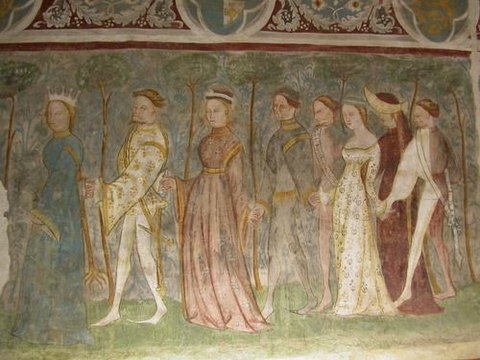I. The courtly elite

Fig. Dance fresco Runkelstein. Courtly round dance. Wall painting (c. 1380, renovated). Castle Runkelstein near Bozen / Bolzano (© Wikimedia Commons). On castles and in palaces the courtly round dance was popular. The music was performed instrumentally by minstrels or sung by the dancers themselves.
The practice of courtliness, which in Austrian regions was particularly distinctive with the Habsburg rulers but also among church princes and dignitaries, encompassed all types of music of the time. Sources report more coincidentally about private music entertainment in chambers and halls. Public court music, on the other hand, is well documented, especially for the reign of Maximilian I. He employed important instrumentalists as performers and composers. The musical culture of his early court in Innsbruck is well documented. The court composer, Henricus Isaac (1496–1517), created a monumental synthesis out of many traditions of vocal music. Emperor Maximilian actively memorialised his rule, including its musical quality, in several written-pictorial monuments. Similarly, court musicians paid attention to their own afterlives with a Humanist attitude, as is shown by the example of organist Paul Hofhaimer. Educated patrons at that time were often Humanists and music connoisseurs; this is attested by new types of music such as the ‘Humanist Ode’ on metrical Latin poetry. The relationship between patron and artist even became the subject of a composition by Isaac (Argentum et aurum). The participation of women in courtly music culture is indisputable, but evidence can in some cases be obtained only indirectly. The successors of Maximilian I. in the Austrian territories were Ferdinand I. and Anna of Hungary; under their government the court chapel and royal trumpet band were partly changed, as shown by documents of the 1520s.
The essays signed with * are not yet available online.
Music and ceremony in Maximilian's Innsbruck
Helen CoffeyThe court chapel of Maximilian I
Grantley McDonaldHenricus Isaac’s Amazonas
David BurnMemorialkultur. Maximilians Monumente*
Grantley McDonaldMemorialkultur. Remembering Paul Hofhaimer
Grantley McDonaldHumanisten, Mäzene, Intellektuelle*
Grantley McDonaldOdengesang bei den Humanisten
Andrea HorzFrauen in Wort, Ton und Bild*
Birgit Lodes, Reinhard Strohm